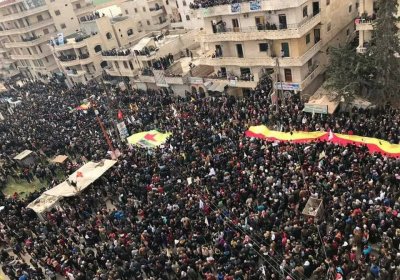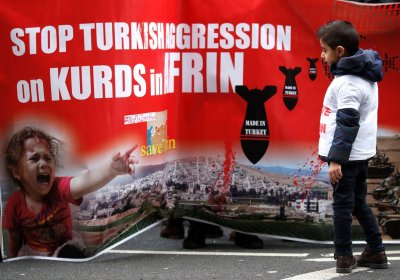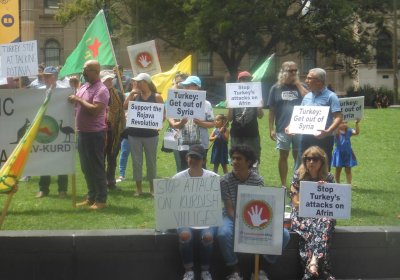Turkey's second largest opposition party — the left-wing, Kurdish-led Peoples’ Democratic Party (HDP) — elected new leaders at its Third Congress on February 11.
Turkey
Thousands of solidarity activists from all across the Democratic Federation of Northern Syria defied a threat of bombardment by the Turkish State on February 6 to stand in solidarity with the resistance in Afrin.
The statement below, “Message from the Women of Afrin to the Women of the World”, was released on February 3 by Kongreya Star Efrin, a confederation of women’s organisatons in Afrin (Efrin in Kurdish).
On January 20, Turkey launched an invasion of Afrin, one of the three cantons that make up the Democratic Federation of Northern Syria (also known as Rojava), the site of a profound, Kurdish-led social revolution based on multi-ethnic participatory democracy and women’s liberation.
The invasion has killed dozens of civilians in an area that has welcomed hundreds of thousands of refugees from Syria’s conflict. Turkey’s actions would be impossible without at least passive acceptance from several great powers active in Syria. Cihad Hammy looks at the motivations for various major players.
The dark clouds of 21st-century fascism are once again hanging over the heads of the people of northern Syria. As if the inhabitants of the region often referred to as Rojava haven’t suffered enough over the course of the past 7 years of war, the Turkish state has come to the conclusion that the time is ripe to pick up the fallen, bloodied sword from the corpse that is Islamic State.
Together with Salafist mercenaries carrying flags of the Syrian ‘rebels’ – one of the many components of what at one historical juncture seemingly all so long ago was a cohesive ‘Free Syrian Army’ – Erdogan’s regime vows a ‘swift operation’ to destroy ‘terrorism’ in Afrin.
The left-wing Peoples’ Democratic Party (HDP) has condemned Turkey’s invasion of the Afrin region in northern Syria (known as Rojava in Kurdish) in collaboration with mostly jihadi Syrian militias.
The HDP, with strong roots in Turkey’s Kurdish minority, has itself faced worsening repression from the regime of President Recep Tayyip Erdogan.
As concerned Australians, we condemn Turkey’s invasion of the mainly Kurdish canton of Afrin in northern Syria, and demand that the Australian Government do all in its power to protest and stop Turkey’s brazen criminal aggression.
After receiving approval from Russia, the Turkish state has launched an air strike with 69 jets, bombing the Afrin centre and Cindirêsê, Reco, Shera, Shêrawa and Mabeta districts in northern Syria, ANF News reported on January 20.
Academics and international human rights activists launched a petition calling upon world powers to act against Turkish aggression against Afrin, ANF News reported.
Dutch journalist Frederike Geerdink has just spent a year with Kurdish forces in northern Syria observing the democratic and feminist revolution unfolding in the region. During her recent visit to Australia, she spoke to Green Left Radio about her experience. Below is an edited and abridged transcript of the interview.
***
The Turkish government has proposed a new law which will ban the use of the words and terms “Kurdistan”, “Kurdish city/cities” and “Armenian Genocide” in parliament.
Parliamentarians who use these words or terms will be fined 12,000 Turkish liras (about $4500) and be banned from participating in three sessions in the Grand Assembly.
Carrying placards, which opposition parties often do to criticise the ruling Justice and Development Party (AKP) government, will also be banned.
Hundreds of thousands of people rallied in the Turkish city of Istanbul after a 280-mile Justice March against Turkish President Recep Tayyip Erdogan.
The demonstration was in response to the widespread jailings and dismissals authorised by the Turkish government after last year’s failed coup attempt.
- Previous page
- Page 10
- Next page











